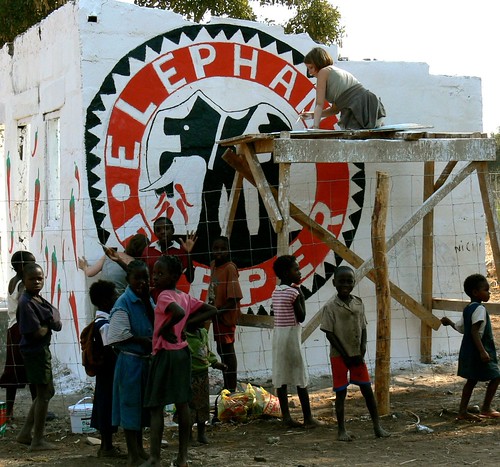
When human-wildlife conflict results in the deaths of wildlife, the outcome can be far-reaching for those populations. Such situations are further amplified when they lead to human deaths as well. Human-wildlife conflict can be caused by a number of factors, but is most commonly agriculture-related. In Africa (and Asia), farmers often find themselves in a gruesome battle defending their livelihood against relentlessly hungry elephants that raid their crop fields.

From beating drums to deploying fireworks to attempting to chase elephants away (which frequently results in human deaths), farmers are often left sleep-deprived and profitless from their agricultural investments. That is until 2002 when stars aligned and a chance meeting between Australian businessman, Michael Gravina, and elephant biologist, Dr. Loki Osborne, resulted in the Elephant Pepper Development Trust (EPDT) and gave new hope to small-scale farmers plagued with elephant problems. Methods for deterring the hungry elephants are only effective if they involve minimal costs and provide long-term solutions. EPDT struck gold when they discovered that elephants are inherently repelled by the smell of chili peppers.

Chilies are easy to grow as they survive in some of the more extreme conditions found in Africa that other crops cannot survive in, are money-making cash crops, and are unpalatable and revolting to most mammal “pests”. EPDT trains local farmers how to implement the use of chilies into their farming practices in a number of ways. Chilies can be planted to create an elephant-repellent buffer zone between valuable crops and wooded elephant habitat. Farmers can also saturate simple string fences with chili grease to discourage elephants from entering. At night (the time when crops are typically raided by the giant pachyderms), briquettes made of chilies and elephant dung can be burned to keep elephants away. Though often skeptical at first, once farmers see the success of these methods playing out for their neighbors, they become sold on these sustainable ideas and seek help from EPDT immediately.

Currently, the Trust is working with communities in areas of Zambia, Botswana, Zimbabwe, Kenya, and Namibia with great success, and uses Educational Demonstration sites to educate farmers about their methods.To increase benefits from the use of chilies, EPDT has joined with African Spices Pvt Ltd. to buy surplus chilies from the farmers which are then used to create delicious chili-based, “uniquely African” blends that are sold commercially as an organic, fair trade product. In this way, the farmers profit from the crops that have been protected by the chili methods, from the chili crop, and from the peace of mind brought to them as a result of all of these factors. Elephant conflicts become almost non-existent, preventing the death and injuries of both humans and elephants in a win-win situation.

10% of profits from “Elephant Pepper” products are given back to EPDT to be used for improving and expanding their program to more farmers and communities. This program also provides a way for the global community to become involved with elephant conservation by purchasing the delicious products and supporting the cause. EPDT’s problem animal control methods help to eliminate serious human-wildlife conflicts and can be used to do the same in other areas of the world where elephants and humans have been battling to the death.

To learn more, please visit their website


I have a T-shirt with this logo on it avaiable from Cafe Press…
http://www.cafepress.com.au/+baseball_jersey,76885473
A great iniative and working with the South Luangwa Conservation Society in South Luangwa, Zambia as well.